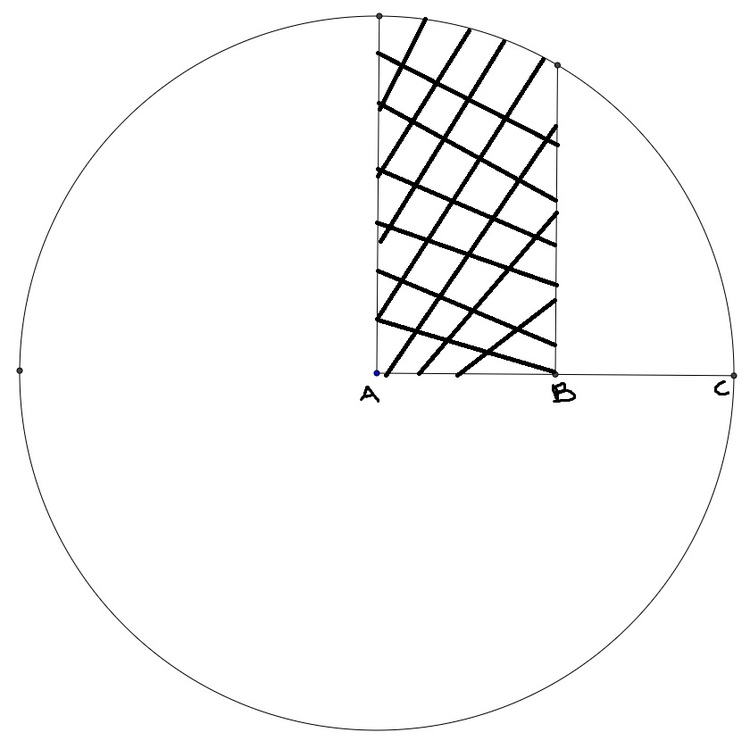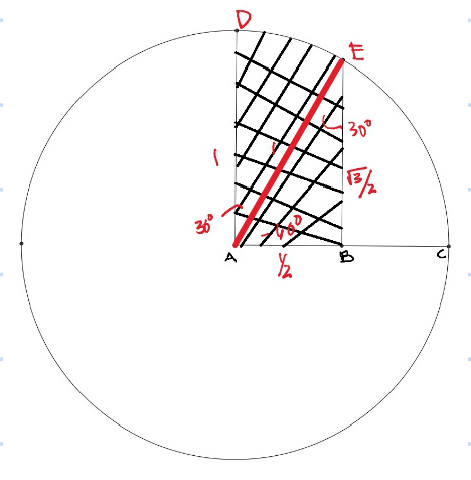Half of Semicircle ? Or maybe not...
 Knowing that the radius of the circle (R = 1) and B is the middle of AC, find the area of the shaded region.
Knowing that the radius of the circle (R = 1) and B is the middle of AC, find the area of the shaded region.
Answer is up to 3 decimals places.
The answer is 0.478.
This section requires Javascript.
You are seeing this because something didn't load right. We suggest you, (a) try
refreshing the page, (b) enabling javascript if it is disabled on your browser and,
finally, (c)
loading the
non-javascript version of this page
. We're sorry about the hassle.
4 solutions
well done sir, but I think the easiest way to do this is to take the ∫ 0 2 1 1 − x 2 d x
Log in to reply
Oh okay. I don't know anything about calculus, so
Log in to reply
I did the same thing as you did. Though using integral is also a good way. It depends on how you want to approach it, either simple geometry or calculus
Might be a typo in your second last sentence Triangle EAB, which is triangle YAB. Also Since you haven't mentioned the steps/formula used to calculate area of triangle YAB here it is: Sine rule can be used to calculate length of side YB, and then use that as height and the base AB , of the triangle YAB to find its area.
Log in to reply
Oh yeah. By the way, you could directly use the formula 2 1 a b sin θ to find the area.
Log in to reply
proof it.....please sir
Log in to reply
@Bhupendra Mahto – In Δ Y A B , ∠ Y A B = 6 0 ∘ , A Y = 1 and A B = 2 1
Hence the area is 2 1 a b sin θ = ( 2 1 ) ( 1 ) ( 2 1 ) ( sin 6 0 ∘ ) = 8 3
we can use this formula 1/4th of area of circle - 1/4 th of area of ellipse
Mark the other points just above A and B as O AND P Join OC . Let it meet PB at X ...then Plzz point what is wrong if any in this solution. Why the answr cming is different ? 1st - area of trapezium OXBA
By Midpoint theorem, XB=1/2 OA = 1/2
By using formula Area comes as 8 3
Now we clearly see that angle OXP = angle BXC =45
Area of part XOP = 1 8 0 4 5 * area of segment OC
Ar(sgmnt OC ) = 4 p i e - 2 1 = 4 p i e − 2
Area of part XOP = 1 6 p i e − 2
Requird area = 8 3 + 1 6 p i e − 2 = 1 6 p i e + 4
= 1 6 7 . 1 4 = 0.446
Log in to reply
Area of part XOP = 1 8 0 4 5 * area of segment OC
Could you explain this step?
Log in to reply
By mid point theorem, OC is bisected at X
X is the centre of the chord making the segment OC ... I thought angle subtended by one arm of OC and a line joining X to a point on the segment , can be taken as a representative of the part it makes of the segment ...then i did wht we do in circles to find the area ..
c o m p l e t e a n g l e = 3 6 0 s u b t e n d e d a n g l e * area of circle ..
Here we see cmplte angle is 180..
I guess this way to find the ratio of parts of a segment acceptable...
Wht do you think?
Log in to reply
@Tanmay Goyal – Ohh. No, you can't do that. The subtended angle has to be the angle subtended at the centre, and that is the segment whose area you get.
But if you did have to find the area of a portion similar to Δ O P X , you could maybe join points to the centre to form a segment whose area you could find by the formula. Just thinking aloud. This part has nothing to do with the problem. :P
Log in to reply
@Omkar Kulkarni – Dear ..I typed the frmula for circle only ..to illustrate its use in a segment ..
jst draw a segment of a circle frmd by a chord with centre Y(of the chord)
nd tell me if you are told 2 find how much a part formed by one arm of the chord nd a line segment with one point as Y and the other one smwhere on the arc making an angle x , makes of the whole segment ,
What would you do?? I m nt getting the option the option to insert an image in the reply ...else i cud 've illustrted better
Log in to reply
@Tanmay Goyal – Oh okay I get you. I don't know how you'd find that.
Log in to reply
@Omkar Kulkarni – I did
1 8 0 a r e a s u b t e n d e d a t t h e c e n t r e o f t h e c h o r d * segmnt area
Here it i (45/180)* sgmnt area
The issue is that O X Y is not a circular sector. Note that 2 2 = O X = X Y = 2 3 − 2 1 .
Log in to reply
@Calvin Lin , Sir then can u plzz tell me how to find the ratio of the parts of a segment of a circle when the centre of the chord which has formed it nd the angle enclosed by 1 arm of the chord nd the line sgment with 1 point as the centre nd the other smwhere on the arc enclosing an angle x , are given .
Log in to reply
@Tanmay Goyal – If you know that the arc is part of a circle, then the easiest way would be to break it out into the triangle and the tiny circular part.
This is essentially what was done, by looking at the sector A X Y which contains the circular part that we're interested in.
Log in to reply
@Calvin Lin – By the way Sir , how to attach n image in the reply
Plzz point out the fault if any in the solution i upvoted nd if there is none then clarify plzz why the answr cming is diferent?

First, I assume the following: A is the center of the circle; The 2 line segments are parallel and are perpendicular to AC. Now, consider the image above.
A r e a = ( 2 1 ) ( 2 3 ) ( 2 1 ) + ( 3 6 0 3 0 ) ( π ) ( 1 2 )
A r e a = 0 . 4 7 8
Pi/4 - (1/4)(2Pi/3 + sin120) = 0.4783
I cheated by calculating the area of the shaded region as a trapezoid :p
yeah, but if you do it like that you're going to get a smaller area which is approx 0.466
Let the point directly above A be X , and the one next to it be Y . I'm gonna assume that ∠ X A C = ∠ Y B A = 9 0 ∘ .
Now, the construction is joining Y A . Since the radius of the circle is 1 , A B = B C = 2 1 and Y A = 1 . So, in Δ A B Y ,
cos ( ∠ Y A B ) = 2 1 ⇒ ∠ Y A B = 6 0 ∘ .
And hence, ∠ X A Y = 3 0 ∘ .
Now all we need to do is find the areas of sector A − X Y and Δ Y A B and then add. The answer comes to be 1 2 π + 8 3 ≈ 0 . 4 7 8 .